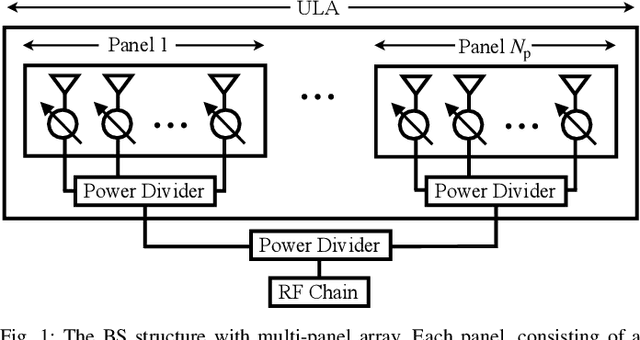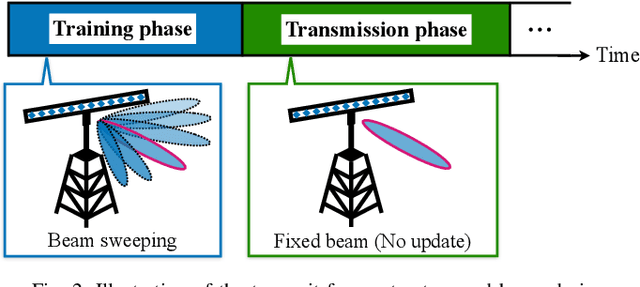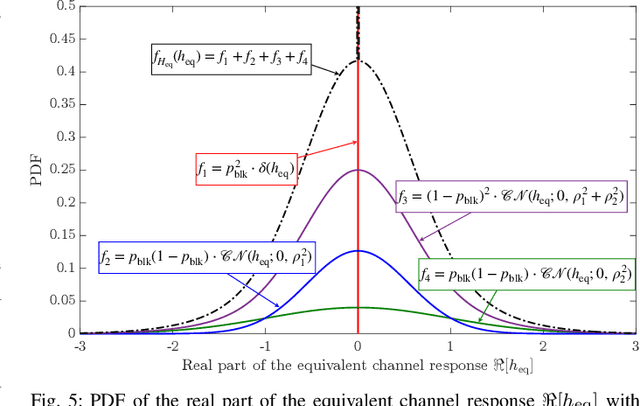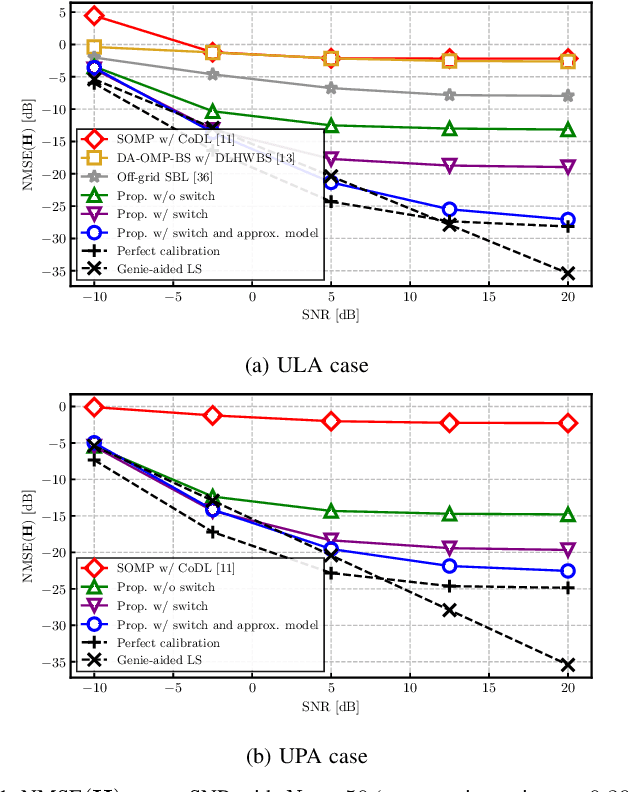Kabuto Arai
Revisiting Beamforming Design for Stable Millimeter-Wave Communications Under Blockages
Mar 07, 2025



Abstract:This study examines analog beamforming designs utilizing multi-panel arrays for millimeter-wave (mmWave) communication systems under stochastic path blockages where each panel is an integrated circuit that includes power amplifiers, a limited number of antenna elements, and the corresponding phase shifters. In existing commercial mmWave systems, analog beams are typically designed by leveraging all panels cooperatively to align with the line-of-sight (LoS) path, thereby maximizing array gain. Although this beam design is effective in static channels, it is highly susceptible to frequent link disconnections caused by sudden path blockages. To address this challenge, the present study revisits the design of analog beamforming and proposes a multi-beam approach using multi-panel arrays to enhance robustness to path blockages. To evaluate the performance of the multi-beam with multimodal directivity, a theoretical analysis of the outage probability of the spectral efficiency (SE) is conducted. To design the optimal multi-beam based on the derived outage probability, we formulate a panel allocation problem to determine the assignment of panels to specific paths, including both LoS and non-line-of-sight (NLoS) paths. Numerical simulations confirm that the optimal beam, at high target SE, comprises a single sharp beam aligned to the LoS path to maximize array gain, whereas the optimal beam at low target SE is a multi-beam aligned to both the LoS and NLoS paths to acquire spatial diversity. These results demonstrate that the proposed multi-beam design, which utilizes multiple paths, effectively enhances the stability of mmWave communications while ensuring a minimum required performance level.
Channel Estimation for Hybrid MIMO Systems With Array Model Errors and Beam Squint Effects
Dec 04, 2024



Abstract:This paper proposes a channel estimation method for hybrid wideband multiple-input-multiple-output (MIMO) systems in high-frequency bands, including millimeter-wave (mmWave) and sub-terahertz (sub-THz), in the presence of beam squint effects and array errors arising from hardware impairments and environmental time fluctuations such as thermal effects and dynamic motion of the array. Although conventional channel estimation methods calibrate array errors through offline operation with large training pilots, the calibration errors remain due to time-varying array errors. Therefore, the proposed channel estimation method calibrates array errors online with small pilot overhead. In the proposed method, array response matrices are explicitly decomposed into a small number of physical parameters including path gains, angles and array errors, which are iteratively estimated by alternating optimization based on a maximum likelihood (ML) criterion. To enhance the convergence performance, we introduce a switching mechanism from an ongrid algorithm to an off-gird algorithm depending on the estimation accuracy of the array error during algorithmic iterations. Furthermore, we introduce an approximate mutual coupling model to reduce the number of parameters. The reduction of parameters not only lowers computational complexity but also mitigates overfitting to noisy observations. Numerical simulations demonstrate that the proposed method effectively works online even with small pilot overhead in the presence of array errors.
Joint Channel and Data Estimation for Multiuser Extremely Large-Scale MIMO Systems
Jun 27, 2024Abstract:This paper proposes a joint channel and data estimation (JCDE) algorithm for uplink multiuser extremely large-scale multiple-input-multiple-output (XL-MIMO) systems. The initial channel estimation is formulated as a sparse reconstruction problem based on the angle and distance sparsity under the near-field propagation condition. This problem is solved using non-orthogonal pilots through an efficient low complexity two-stage compressed sensing algorithm. Furthermore, the initial channel estimates are refined by employing a JCDE framework driven by both non-orthogonal pilots and estimated data. The JCDE problem is solved by sequential expectation propagation (EP) algorithms, where the channel and data are alternately updated in an iterative manner. In the channel estimation phase, integrating Bayesian inference with a model-based deterministic approach provides precise estimations to effectively exploit the near-field characteristics in the beam-domain. In the data estimation phase, a linear minimum mean square error (LMMSE)-based filter is designed at each sub-array to address the correlation due to energy leakage in the beam-domain arising from the near-field effects. Numerical simulations reveal that the proposed initial channel estimation and JCDE algorithm outperforms the state-ofthe-art approaches in terms of channel estimation, data detection, and computational complexity.
 Add to Chrome
Add to Chrome Add to Firefox
Add to Firefox Add to Edge
Add to Edge